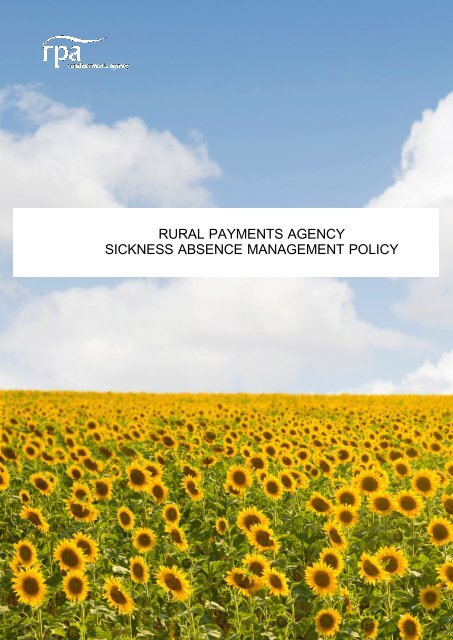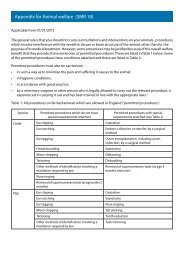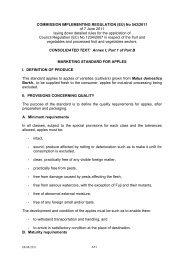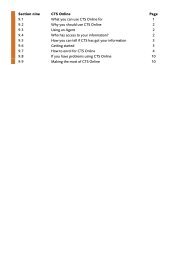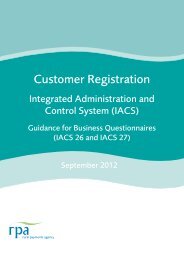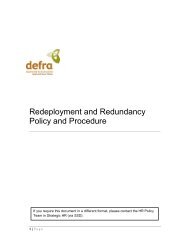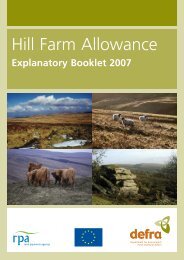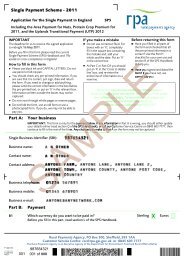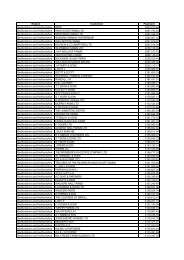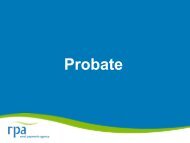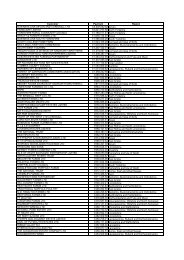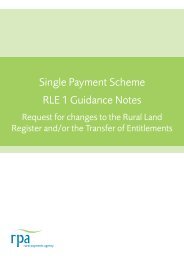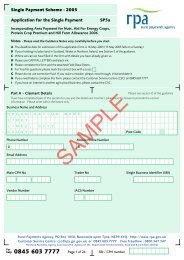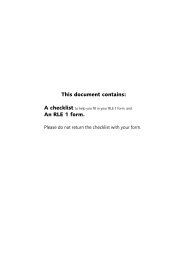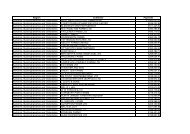Sicknesss Absence Management Policy v1.1.pdf - The Rural ...
Sicknesss Absence Management Policy v1.1.pdf - The Rural ...
Sicknesss Absence Management Policy v1.1.pdf - The Rural ...
You also want an ePaper? Increase the reach of your titles
YUMPU automatically turns print PDFs into web optimized ePapers that Google loves.
RURAL PAYMENTS AGENCY<br />
SICKNESS ABSENCE MANAGEMENT POLICY<br />
Version No: 1 01/11/2008<br />
Page 1
SICKNESS ABSENCE MANAGEMENT<br />
POLICY<br />
CONTENTS<br />
1 <strong>Policy</strong> Outcome............................................................................................................................3<br />
2 <strong>Policy</strong> Principles...........................................................................................................................3<br />
3 Diversity and Equality ..................................................................................................................4<br />
4 Reporting and Recording Sickness <strong>Absence</strong>..............................................................................4<br />
5 Certification ..................................................................................................................................5<br />
6 Pay During Sickness <strong>Absence</strong>....................................................................................................6<br />
7 Disability Discrimination Act 1995 (DDA 1995) Considerations ................................................6<br />
8 Notification of Infectious Diseases...............................................................................................6<br />
9 Return to Work Following Sickness <strong>Absence</strong>.............................................................................7<br />
10 Monitoring Sickness <strong>Absence</strong>......................................................................................................7<br />
11 Repeated Short Term Sickness <strong>Absence</strong>...................................................................................7<br />
12 Long Term Sickness <strong>Absence</strong>.....................................................................................................8<br />
13 Medical Suspension.....................................................................................................................8<br />
14 Disciplinary and Capability Procedures.......................................................................................8<br />
15 Medical Referrals .........................................................................................................................8<br />
Version No: 1 03/11/2008<br />
Page 2
SICKNESS ABSENCE MANAGEMENT<br />
POLICY<br />
1 <strong>Policy</strong> Outcome<br />
1.1 To create, promote and sustain a well-being culture in <strong>Rural</strong> Payments Agency (RPA).<br />
1.2 To ensure that absence is kept down to a minimum level per employee on a year to year basis.<br />
1.3 To ensure that sickness absence is recorded as required by RPA’s reporting requirements to a<br />
98% degree of accuracy.<br />
2 <strong>Policy</strong> Principles<br />
2.1 This <strong>Policy</strong> applies to all RPA employees including Fixed Term Appointments (FTAs).<br />
2.2 Sick absence is not to be considered as part of additional annual entitlement to leave but a<br />
provision to support those who require time off due to illness.<br />
2.3 <strong>The</strong> RPA is required to ensure the health, safety and welfare of all employees through sound<br />
working practices and a safe working environment.<br />
2.4 Employees who are absent from work due to ill health or injury will be treated fairly and<br />
provided with appropriate support for their recovery and return to work. RPA will provide<br />
consistent, fair and effective procedures to record and monitor sickness absence and to<br />
manage the consequences of long term absence due to ill health.<br />
2.5 Cases of long-term absence or persistent short-term absences which are expected to continue,<br />
will be covered under the provisions of the Capability <strong>Policy</strong>.<br />
2.6 To ensure that employees are treated fairly, the RPA will:<br />
• Operate an occupational sick pay scheme which provides sick pay to employees who are<br />
genuinely unfit for work, in accordance with their terms and conditions of service.<br />
• Provide an Occupational Health Service to which employees may be referred so that a<br />
professional medical opinion or advice may be obtained.<br />
• Monitor levels of sickness absence and wherever possible make every effort to reduce<br />
such levels.<br />
• Identify employees whose sickness absence records are unsatisfactory and investigate<br />
the circumstances to ensure that all possible steps are taken to assist the employee to<br />
improve their absence record.<br />
• Investigate any underlying causes of high sickness absence within jobs or job groups and<br />
follow up with employees as appropriate.<br />
• Consult with Health and Safety, the Equality and Diversity Manager and any other bodies<br />
as appropriate.<br />
2.7 <strong>The</strong> RPA recognises the importance of creating a healthy working environment and work<br />
practices to underpin employees’ well-being in the workplace. As part of this, the approach to<br />
managing employees who are temporarily unfit for work is important to the success of the RPA.<br />
Line Managers and others play a crucial role in achieving this objective.<br />
Version No: 1 03/11/2008<br />
Page 3
SICKNESS ABSENCE MANAGEMENT<br />
POLICY<br />
2.8 <strong>The</strong> Line Manager will actively manage absence within their team and is responsible for<br />
monitoring and recording trigger points.<br />
2.9 HR Business Partners may chose to delegate authority to members of their HR team where<br />
appropriate but will retain ultimate responsibility for HR functions.<br />
2.10 Authorised absences covered under the Special Leave <strong>Policy</strong> or Maternity / Adoption Leave<br />
and Disability Leave procedures are not considered absence due to health reasons.<br />
3 Diversity and Equality<br />
3.1 RPA promotes equality of opportunity among its workforce and as such ensures that<br />
arrangements put in place are objective, fair, and transparent, applying the same standards<br />
irrespective of: race, ethnic or national origin, disability, gender, marital status, age, sexual<br />
orientation, religion/belief or working pattern. Further information on RPA’s Equality and<br />
Diversity <strong>Policy</strong> is available on RPA’s intranet. Alternatively you may contact the Equality &<br />
Diversity Manager in Strategic HR in Reading or your local Equal Opportunity Officer.<br />
4 Reporting and Recording Sickness <strong>Absence</strong><br />
4.1 Line Managers should ensure that their employees understand and comply with the reporting<br />
arrangements for sickness absence.<br />
4.2 Employees who are absent from work due to ill health must telephone and speak to their Line<br />
Manager by 10:00 a.m. on the first day of sickness absence. Where they wish to retain<br />
confidentiality with regards to the nature of the ailment they must contact their local HR team.<br />
<strong>The</strong>y should indicate, where possible:<br />
• why they can’t attend and in case of illness what is wrong with them;<br />
• whether they have been or will be consulting a doctor or seeking any other medical<br />
assistance;<br />
• when they expect to be able to attend work;<br />
• whether there is anything that needs to be covered off in their absence.<br />
4.3 Should the employee be too ill to telephone the Line Manager, a family member or<br />
friend should telephone on their behalf as soon as practicable.<br />
4.4 As soon as a Line Manager becomes aware that a member of staff is absent they should enter<br />
the starting date of the absence on ESS. <strong>The</strong> end date must be left open until the individual<br />
returns to work.<br />
4.5 For continuing periods of sickness absence, employees must keep their Line Manager informed<br />
on their progress regularly, or at intervals agreed with their Line Manager, during the absence.<br />
<strong>The</strong> Line Manager and employee should agree appropriate arrangements for keeping in touch.<br />
Version No: 1 03/11/2008<br />
Page 4
SICKNESS ABSENCE MANAGEMENT<br />
POLICY<br />
5 Certification<br />
5.1 Self certification - <strong>Absence</strong>s of seven calendar days or less<br />
5.1.1 Employees must provide a written s elf certified declaration to their Line Manager or<br />
local HR team (if they do not wish to disclose the nature of the illness to their Line Manager).<br />
Exceptionally, a doctor may provide a certificate for this initial period of absence but this is not<br />
usual practice. <strong>The</strong> Line Manager will record the self certification on ESS when it is received<br />
and authorised on the employee’s first day back at work.<br />
5.2 Medical certification - <strong>Absence</strong>s of eight calendar days or more<br />
5.2.1 Medical Certification must be supported by a certificate signed by a qualified medical<br />
practitioner, stating the cause and probable duration of the absence.<br />
5.2.2 <strong>The</strong> employee should fully complete the reverse side of the medical certificate and unless they<br />
anticipate returning to work within seven calendar days after the certificate was issued, the<br />
certificate should be sent to their Line Manager or local HR team as soon as possible.<br />
5.2.3 If an employee is not well enough to return to work by the date specified on a medical<br />
certificate, a further certificate to run from the expiry of the previous one must be obtained and<br />
unless they anticipate returning to work within seven calendar days after the certificate was<br />
issued they must ensure that the certificate reaches their Line Manager before the previous<br />
certificate expires.<br />
5.2.4 Any certificate that does not state the probable duration of absence will not be treated as valid<br />
for more than seven days.<br />
5.2.5 If self certificates or medical certificates are not provided or submitted late, without reasonable<br />
cause, salary payment and or Statutory Sick Pay (SSP) for the period of sickness absence will<br />
not be made.<br />
5.2.6 If an employee believes that their absence from work is due to an injury at work or as a result<br />
of an industrial disease contracted at work i.e. an illness or condition that is directly related to<br />
the work that the employee is engaged in, this should be stated on the self-certificate so that<br />
the necessary investigation into the circumstances can be undertaken and an accident report<br />
form should be completed.<br />
5.2.7 RPA reserves the right to request a medical certificate at any time. If an employee’s GP<br />
requests payment then the employee must contact their local HR team to arrange for payment<br />
by invoice.<br />
5.2.8 An employee will not be paid for any days they are away from work because of illness unless<br />
they provide self, or medical certification, which has been properly completed by the<br />
employee, covering the period of absence and gives details of what was wrong. Failure to<br />
provide prompt notification of the reasons for absence and any failure or delay in providing a<br />
proper certificate, without reasonable cause may result in pay being withheld and the absence<br />
being recorded as unauthorised.<br />
Version No: 1 03/11/2008<br />
Page 5
SICKNESS ABSENCE MANAGEMENT<br />
POLICY<br />
5.2.9 If an individual is on sickness absence, they must not undertake any existing or new<br />
alternative employment or voluntary activity, whether paid or unpaid without having first<br />
obtained approval from your HRBP.<br />
5.2.10 Contractors or employment agency staff are not required to complete a Self Certification Form<br />
on ESS but details of their periods of absence should be recorded by their Line Manager for<br />
invoice authorisation purposes.<br />
6 Pay During Sickness <strong>Absence</strong><br />
6.1 All employees, providing they have complied with the absence notification procedure may<br />
receive:<br />
• full pay for up to a total of 6 months sickness absence in a 12 months rolling period;<br />
• half pay for a further 6 months within the 12 months,<br />
• An overall limit of 12 months sick pay in a 4 years rolling period.<br />
6.2 Statutory Sick Pay (SSP) is normally paid by employers on behalf of the Department for Work<br />
and Pensions for up to the first 28 weeks of sickness absence. You can find the rules and<br />
regulations on SSP on the DWP website<br />
http://www.dwp.gov.uk/lifeevent/benefits/statutory_sick_pay.asp If you qualify for RPA provisions,<br />
SSP is:<br />
• Included within the limit of full pay<br />
• In addition to half pay, and<br />
• In addition to Sick Pay at Pension Rate (SPPR)<br />
6.3 SSP is treated as pay when assessing periodical contributions deductible under Civil Service<br />
Pensions arrangements. When it is paid in addition to sick pay it reckons towards pension<br />
benefits, except when SSP is paid with sick pay at pension rate.<br />
7 Disability Discrimination Act 1995 (DDA 1995) Considerations<br />
7.1 Under section 1 of the DDA a person is defined as disabled who: has a physical or mental<br />
impairment which has substantial and long term adverse effect on their ability to carry out<br />
normal day to day activities. Employees who fall under this category will be treated in<br />
accordance with RPA’s Disability Leave <strong>Policy</strong>.<br />
8 Notification of Infectious Diseases<br />
8.1 Employees must inform the RPA as soon as they are aware of contracting a “notifiable”<br />
infectious disease and must not attend work. <strong>The</strong>y should inform their Line Manager or local HR<br />
team at the soonest practical opportunity. If their Line Manager is not available the employee<br />
should inform another Line Manager (at the same grade) in the same location/area. Where a<br />
member of staff is not permitted to come into their office because they have been in contact<br />
with someone who has a notifiable disease but they are not exhibiting any symptoms, their<br />
Line Manager must undertake a risk analysis and look into available alternative options (e.g.<br />
home working) before taking the decision to grant paid Special Leave.<br />
Version No: 1 03/11/2008<br />
Page 6
SICKNESS ABSENCE MANAGEMENT<br />
POLICY<br />
9 Return to Work Following Sickness <strong>Absence</strong><br />
9.1 When an employee returns to work following sickness absence, they should report to their<br />
Manager as soon as possible on their first day back at work, where practical. <strong>The</strong> Line<br />
Manager will conduct a Return to Work interview to ensure that the employee is fit for work and<br />
to address any other issues related to their sickness absence.<br />
9.2 <strong>The</strong> Return to Work meeting should be held as soon as possible on the morning of their return<br />
to work, where practical, using the Return to W ork interview form. Once complete this<br />
should be signed by the employee and the Line Manager and sent to the local HR team and be<br />
placed on the employee’s personnel file.<br />
10 Monitoring Sickness <strong>Absence</strong><br />
10.1 Line Managers should regularly review sickness absence to ensure that the Team is able to<br />
function effectively, and to check for patterns of absence.<br />
10.2 Trigger points for management action are in place to identify when an individual’s cumulative<br />
absences from work need to be reviewed. <strong>The</strong> trigger points are as follows:<br />
• 6 spells of absence in any 12 months<br />
or<br />
• 9 days of self-certificated absence in any 12 months<br />
or<br />
• 12 days of mixed certificated absence in any 12 months.<br />
10.3 When an employee’s absence reaches a trigger point the Line Manager should meet with the<br />
employee to discuss the reasons for the sickness absence and to identify any underlying<br />
issues.<br />
10.4 If an employee’s absence pattern gives a Line Manager cause for concern, they should discuss<br />
it informally with the employee at the earliest opportunity. If the Line Manager is concerned<br />
about an employee’s level of sick absence, or if the employee has an accident at work, they<br />
may be required to undertake a medical referral.<br />
10.5 If after having received an Occupational Health report following a medical referral the Line<br />
Manager is still concerned about an employee’s level of sickness absence and their ability to<br />
undertake their contractual obligations the Capability <strong>Policy</strong> should be used.<br />
10.6 In all circumstances Line Managers should hold Return to Work interviews and discuss the<br />
attendance to date with employees.<br />
11 Repeated Short Term Sickness <strong>Absence</strong><br />
11.1 <strong>The</strong> point at which a Line Manager should express concern is not fixed but examples of the<br />
circumstances that may prompt further investigation are included in the guidance notes.<br />
11.2 If the Line Manager is concerned about the level of sickness absence, they should have an<br />
Attendance Review meeting with the employee. A record of the meeting should be made by the<br />
Line Manager a copy given to the employee and one sent to the local HR team. This will give<br />
the employee and their Line Manager a chance to discuss the absence record, reasons for the<br />
Version No: 1 03/11/2008<br />
Page 7
SICKNESS ABSENCE MANAGEMENT<br />
POLICY<br />
absence, any other relevant information and the improvement that is required over a specific<br />
period. If, after the discussion it is apparent that there is an underlying problem, the Line<br />
Manager should discuss the situation with their local HR team. In some cases, an investigation<br />
may be necessary and it may be appropriate to take this forward as part of the RPA’s Capability<br />
Procedure.<br />
12 Long Term Sickness <strong>Absence</strong><br />
12.1 Line Managers should inform and seek the advice of the local HR Teams in cases where<br />
sickness absence extends to 21 consecutive days or more. <strong>The</strong> Line Manager should maintain<br />
contact with the employee in order to remain updated about the likely duration of the sickness<br />
absence. For long term absence the expectation is that Line Managers should keep in touch on<br />
at least a fortnightly basis via telephone call. <strong>The</strong> employee has a responsibility to update their<br />
Line Manager and the local HR team on the employee’s likely date of return to work.<br />
12.2 HR may decide to refer the employee to the Occupational Health Service for advice on the<br />
employee’s illness, a likely return to work date and any rehabilitation advice. RPA may also<br />
request, with the employees consent, a medical report from the employee’s own Doctor. Once<br />
advice has been received from the Occupational Health Service, the employee should be<br />
invited to a meeting to discuss the issue with their Line Manager, and a HR Representative, if<br />
necessary. Although this must not be regarded as a formal stage of the Capability or<br />
D isciplinary procedures, if the individual is particularly anxious about the meeting they may<br />
request that they are accompanied by a c olleague or TU R epresentative. After the<br />
meeting, the Line Manager should write to the employee notifying them of the outcome.<br />
A copy should be kept on the employee’s personnel file.<br />
12.3 <strong>The</strong> RPA will, where an employee’s sickness falls under the Disability Discrimination Act 1995<br />
(DDA) seek to make ‘reasonable adjustments’ as stated by the DDA before the employee can<br />
return to their job. Pending the adjustments being made the employee may be asked to remain<br />
at home on full pay or may be expected to attend work undertaking modified duties.<br />
13 Medical Suspension<br />
13.1 If the RPA concludes that the employee is not able to attend work due to an identifiable Health<br />
and Safety risk that would relate to themselves or others in the workplace, they can be<br />
suspended from work on medical grounds. <strong>The</strong> RPA may keep an employee on medical<br />
suspension whilst it seeks Occupational Health advice to establish whether an employee is able<br />
to safely return to work after a period of sickness or injury.<br />
13.2 <strong>The</strong> employee will stay on full pay whilst medically suspended.<br />
14 Disciplinary and Capability Procedures<br />
14.1 An employee who fails to comply with reporting or certification procedures, or who otherwise<br />
abuses the Sickness <strong>Absence</strong> <strong>Management</strong> <strong>Policy</strong>, will be subject to either the RPA’s<br />
Disciplinary or Capability procedure depending on the circumstances of the case.<br />
15 Medical Referrals<br />
15.1 In certain circumstances the RPA may require employees to be medically examined by a<br />
registered medical practitioner nominated by the RPA. <strong>The</strong> purpose of such an examination is<br />
Version No: 1 03/11/2008<br />
Page 8
SICKNESS ABSENCE MANAGEMENT<br />
POLICY<br />
to determine whether there is an underlying medical problem or any matters which might impair<br />
the employees’ ability to perform their duties and if so any reasonable steps the RPA may take<br />
to support the employee.<br />
15.2 If an employee refuses, without acceptable reason, to attend a medical examination or give<br />
their consent to the RPA to obtain a medical report, they will be made aware that without a<br />
report the RPA might have to make a decision regarding the employee’s employment position<br />
in the absence of the appropriate medical information.<br />
Version No: 1<br />
<strong>Policy</strong> Owner: <strong>Rural</strong> Payments Agency, Agency Executive Group<br />
<strong>Policy</strong> Custodian: Head of Strategic HR<br />
Approved By: A Good HR Director Date: 3 rd Nov 2008<br />
Date of Launch: 3 rd Nov 2008<br />
Version No: 1 03/11/2008<br />
Page 9


